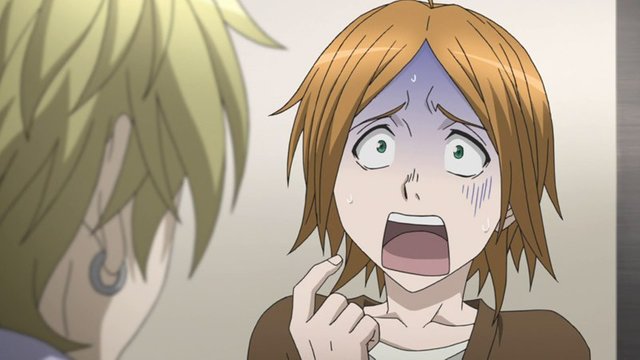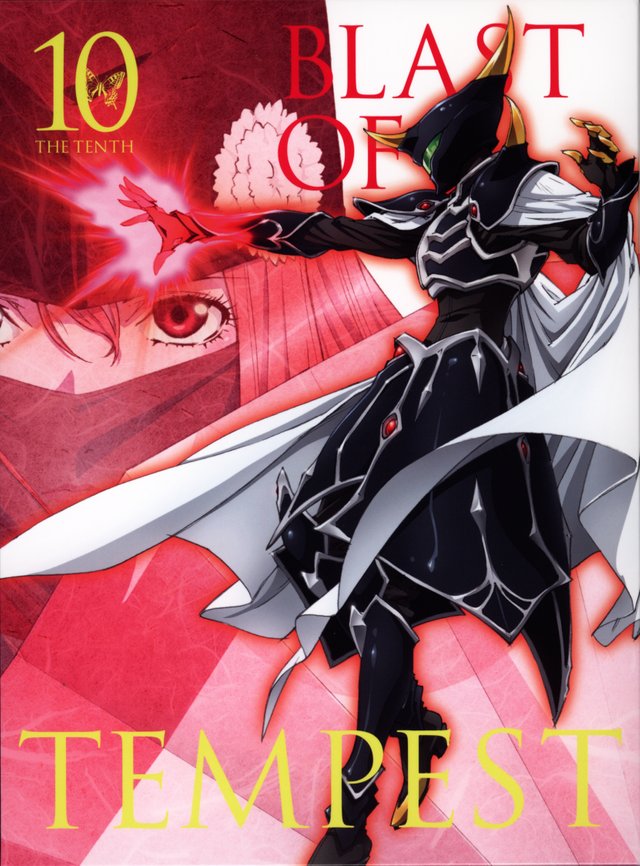Everybody knows That Guy. He’s in the corner in the dorky clothes, his eyes always trained on the floor, either mumbling in hesitant whispers or holding court in long droning tirades. He holds a dead-end job and lives in a dead-end home, either in a tiny danky apartment or his parents’ basement. He’s got no obvious skills, no aspirations, no desire to rise above his lot, and no idea how to handle himself or how people really see him. He lives a life of bitterness, envious of other people’s success and maybe obsessed with the One Perfect Woman.
And one day, by an Act of Rob, he is imbued with a superpower.
His life suddenly turns around. Villains crumble at his presence. Beautiful women throw themselves at his feet. Powerful men are overwhelmed with jealousy but fail to topple him. Riches rain from the heavens. But at heart, he is still a loser in word and deed.

Only in Manhwa Land
This is not about the Super Loser trope, where the loser is acknowledged and portrayed as a loser in-universe despite his powers. Stories featuring superpowered losers as protagonists are adolescent wish fulfilment fantasies. It is a reassuring delusion that even losers can find wealth and women without needing to put in the work to overcome their weaknesses and insecurities. All he has to do is to have a convenient superpower fall into his lap.
The superpower itself comes in many forms. A supernatural boon that allows anyone to instantly feel pleasure through skin contact, a suit of high-tech powered armor, a sudden ability to use magic or extrasensory perception, or some other plot device. Whatever this superpower may be, its key feature is that its insertion into the story automatically elevates the protagonist into an untouchable, desirable being head and shoulders above everybody else. He doesn’t have to learn how to charm or think or fight; the superpower automatically takes care of that. He may encounter challenges and rivals, but thanks to his superpower, he will always prevail.
The superpower itself serves only to fulfil the loser’s greatest desires. When activated, it is an unstoppable instant-win device. In Korean webcomic Love Parameter, hopeless nerd Young Hoon receives a special pair of glasses, allowing him to read the parameters of everyone around him. When he wants to seduce a woman, the glasses tell him exactly what to say. All he needs to do is follow the script, and every woman he meets falls into his bed. Likewise, in Sweet Guy, Go Ho-Sang develops the miraculous ability to make anybody instantly feel good at a touch. He is the very model of a modern Korean loser -- dead-end customer service job, unfashionable clothes, zero social skills -- but after developing the power, no end of sexually aggressive women pursue him day and night.
In these stories the superpower is a crutch. Young Hoon doesn’t have to dress well, exercise or make himself more desirable; he just has to follow the script on his spectacles, and all the hot women come running at his beck and call. Ho-Sang never has to learn how to speak to women; he merely needs to ‘accidentally’ touch his target, or at most cook up an excuse to touch her, and a neverending stream of beauties will rush him into bed. Quite conveniently, they are all aggressive go-getter types, so he never needs to learn how to talk to women -- not even his love interest. Take away their superpowers, and they will still be losers.
In traditional superhero stories, we see heroes using their powers for a higher and nobler cause, such as justice or protecting civilisation from world-eating monsters. They use their powers for a cause higher than themselves, face and overcome incredible challenges, and emerge as heroes worthy of the title. Superpowered loser stories are an inversion: they are about the loser relying on his superpower only to feed his ego and place himself above other men. There is no higher cause, there is no challenge to be a greater man, there is only the bacchanalian celebration of the ego.
Stories about superpowered losers are weak because the protagonists remain losers. Actions transform people. Events give people the impetus to choose to be better. Losers choose to remain static, to maintain the core traits that kept them as losers and instead lean on their superpowers. As their superpowers will never fail, they have no incentive to get better, no obstacle they have no doubt of overcoming, no reason to do anything with their powers other than feed their ego. As a result, there is no drama, no tension, no believable conflict -- only the boring certainty that things will go his way and the inevitable pain of watching the loser stumble through the rest of life.
Rehabiliating the Loser

Yes, that means you.
To make a story about a superpowered loser work, the writer has to do two things: the loser must choose to use the superpower for a greater good, and the superpower cannot be a crutch. By pursuing a higher purpose, the protagonist has the motivation to become stronger, and will encounter supervillains that force him to keep honing his skills. The combination of internal and external desires combine to catalyse the loser’s transcendence. There are two ways to do this.
The first way is for the superpower to transform the protagonist. In DICE: The Cube That Changes Everything, Dongtae is a loser who is constantly bullied and shunned by everyone. One day, he picks up a mysterious die, becoming a participant in a game that allows players to complete quests in exchange for more dice. When rolled, these dice grant dicers points that can be invested in their stats or exchanged for goods. Dongtae uses the dice to become stronger, faster and more intelligent, and roundly chastises the bullies.
But there are more dicers out there. As gamemaster ‘X’ spreads the dice across the Korea, Dongtae’s school is thrown into chaos. His schoolmates will do anyything for more dice, including hunting and harming other dicers or innocents. Dongtae vows to challenge X and end the madness once and for all.
This story works on two levels. First, the proliferation of dice ensures that using them does not automatically lead to an effortless win, at least not against other dicers. While dice-granted abilities are powerful, none of them render the user invincible; a dicer must still use his powers intelligently or he will be defeated. Further, dicers who invest points in the wrong stats quickly pay the price when facing more skilled opponents. Second, Dongtae's powers catalyse his character evolution. His motivation for using the dice stems from a desire to not be a loser, but as the story progresses, he chooses to use his powers to protect his friends and confront X. By using his power for a cause greater than himself, he leaves behind his adolescent wish fulfilment fantasies and takes on the mantle of a hero. As he encounters ever-more-powerful villains, he must strive to get better and attain more skills just to survive –- yet the dice quests force him to choose between expeditiously gaining more dice and doing the right thing.
The second way to rehabilitate a superpowered loser is to have other characters build him up. In Zetsuen no Tempest, the Tree of Genesis threatens to destroy human civilisation. Halfway through the series, Hanemura Megumu makes his debut. Hanemura is a weak-willed and wimpy construction worker who just broke up with his girlfriend…and who was incidentally chosen by the Tree of Exodus to defeat the Tree of Genesis.
As the Magician of Exodus, Hanemura may be the avatar of destruction, but he is still a loser. The other main characters train him to become worthy of his powers. He is beaten black and blue repeatedly, and keeps whining whenever that happens, but he still comes back for more. At the series’ end, Hanemura saves the world from catastrophe, and prepares to reconcile with his ex-girlfriend.
Once again, we see the superpowered loser choosing to use his powers for the greater good and to put in the effort to overcome his failings. Here, instead of the superpowers catalysing his growth, other characters force him to grow. Where superpower-as-catalyst brings out the protagonist’s innate drive, this approach uses characters to catalyse the loser’s development. The former approach makes for a story that allows the protagonist to dig deep and find himself, while the latter has plenty of opportunities for character drama.
The third way of reversing the superpowered loser trope is simply to play it straight. The superpower is a crutch and the loser is still a loser. Sure, he can elevate himself above others for a while, but there are always better men -- and when reality hits, it hits hard. A villainous example of this are many of the evil vampires in Hellsing. They believe that their vampire powers make them unstoppable, but Alucard curbstomps them without breaking a sweat, usually by showing them the error of their ways through absorbing their most powerful attacks without even a scratch.
This approach knocks out the superpower, revealing it for the crutch it really is. Assuming the loser survives the fall, he now has the impetus to become stronger and stop relying on his gift. To complete the transformation, the sudden shock causes the loser to re-evaluate his life and strive to become a better man.

You ready to be a hero?
Zero to Hero
The superpowered loser is a tired trope because it is mere wish fulfilment. Instead of pursuing transcendent goals, it is all about elevating and preserving the ego. This inevitably leads to a boring story without drama, tension or opportunity for character development. Instead, give the loser a reason and a drive to be great, and watch him become a superhero.
--
Photo Credits:
Sweet Guy cover: original image from Baka Updates
Hanemura Megumu: Zetsuen no Tempest anime episode 15
Blast of Tempest Volume 10
If we're talking about Manhwa, Tower of God's Baam is basically the mirror of this trope. Somewhat of an overpowered protagonist (relatively speaking, considering the general power level of the residents of the Tower), but he's a decent, caring, if naive, human being.
Tower of God is kinda the inverse of wish fulfillment fantasies, since it's more about the cost everyone pays to achieve their desires than the act of desire-getting itself. Endorsi being the prime example of this. Or FUG in general. Or the whole Tower in general, really.
Downvoting a post can decrease pending rewards and make it less visible. Common reasons:
Submit
That sounds far more interesting than your typical wish fulfilment story.
Downvoting a post can decrease pending rewards and make it less visible. Common reasons:
Submit
The rise of this trope is probably due to the rise of the "herbivore " man in Japan and to a lesser extent Korea. To be honest, I can't recall any literature on this trope outside of manga/manhwa. I wonder if this trope has always been around.....
Downvoting a post can decrease pending rewards and make it less visible. Common reasons:
Submit
It's certainly prominent in manga and manhwa targeted at young boys or losers. The passive loser protagonist archetype tends to be an Asian thing. Western culture seems generally contemptuous of such people, so much so no one bothers to make them protagonists. Especially since losers, in the real world, wouldn't bother to get off the couch and Do Stuff, much less drive a story.
This seems to be the Western equivalent: https://alphagameplan.blogspot.sg/2016/09/gamma-fantasy-novel-one.html
Not a total loser, insofar as the protagonist Gets Stuff Done, but it's still a highly self-centred story that is all about wish fulfilment instead of higher and finer goals.
Downvoting a post can decrease pending rewards and make it less visible. Common reasons:
Submit